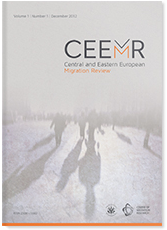Snakes or Ladders? Job Quality Assessment among Temp Workers from Ukraine in Hungarian Electronics
Snakes or Ladders? Job Quality Assessment among Temp Workers from Ukraine in Hungarian Electronics
Author(s): Tibor MeszmannSubject(s): Migration Studies
Published by: Ośrodek Badań nad Migracjami / Uniwersytet Warszawski
Keywords: migration; precarious employment; temporary work agencies; job quality; Hungary; Ukraine
Summary/Abstract: 10.17467/ceemr.2019.03In contrast to the usual integration of migrant workers in the ‘bottom jobs’ on the labour market, the employment of Ukrainian workers in Hungarian electronics plants seems to take place in a more beneficial way. With the active mediation of temporary (temp) agencies, Ukrainian migrant workers are offered regular blue-collar assembly work, together with the same social rights and benefits as their local Hungarian colleagues. Relying, in our analysis, on the literature on industrial sociology, migration research and global value chains, we are developing a critical perspective in which migration and employment are not seen as separate spheres but as mutually reinforcing each other. We combine bottom-up empirical research based on interviews with workers and a sectoral inquiry on industrial and employment relations in the temp agency sector supplying multinational corporations. Our main argument is that complex contracting also means subtle controlling. Such contracting is not the cheapest form but it creates a different, efficient employment regime with dependent, controllable, flexibly available, ‘fluid’ employees. Employee respondents described their position as dependent, ‘out of control’ and a temporary earning opportunity. Devoid of clear mechanisms for controlling their work conditions or growth within the job, all respondents turned to a more instrumental approach, in which they invested in building up social capital through friendships, networks and personal relationships. Obtaining Hungarian citizenship and learning the language were two other main strategies for dealing with insecurity. Their efforts correspond with and reinforce a more globally integrated but ethnically motivated immigration regime, characteristic of post-socialist Hungary.
Journal: Central and Eastern European Migration Review
- Issue Year: 8/2019
- Issue No: 1
- Page Range: 75-93
- Page Count: 19
- Language: English

